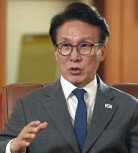[Opinion] Zhao Ziyangs Legacy
[Opinion] Zhao Ziyangs Legacy
Posted January. 24, 2005 23:11,
Give me democracy or death. This was the slogan of the students who filled Tiananmen Square in May 1989. It was before President Mikhail Gorbachev of the former Soviet Unions visit. Then-Chinese Communist Party Chief Zhao Ziyang lost power there for shedding tears and saying, Im sorry. I came too late, when he visited the spot of the patriotic movement by patriotic students. After his death he was called Chinas Gorbachev Tiananmen is quiet. The funeral schedule allegedly could not be set due to disagreements between the government authorities and his family on how to evaluate him, but the foreign press conveyed that the university towns were peaceful. Where has all the zeal for democracy faded away to?
In a picture showing Zhao in front of the students with a megaphone 16 years ago is the current premier, Wen Jiabao, and his young features as an assistant buttressing the argument for the reform of the Communist Party. His assistant relationship with Zhao, whose political life ended that day, ended. Having become the premier in 2003, he did not answer journalists questions on Zhao. He only responded, Reflecting on the past 13 years of astonishing achievements, what is most important to us is stability.
Is it attributable to that stability that the contemporary Chinese youth are apolitical according to the BBC? Their priority lies in how to live well. Quite a few students say, Idealism back then was too naïve, or we would not have dashed out instinctively like that. Some also answered that they would have appealed to the media.
Revolutions explode not when suppression is extreme, but when bloated expectations burst without mercy. Deng Xiaoping saw through this. He hastened economic reforms after the Tiananmen crisis because of this reason. Just back 15 or 16 years ago, the party meddled in personal lives, telling people where to live or not live, but this does not apply anymore. There are some free elections and the media also can criticize the government as long as they maintain the line and not touch the core. It is needless to talk about the glorious economic developments. Nobody can know whether these changes could have been possible without Zhaos tears. Thus, it is said that history cannot be evaluated by todays criteria.
Editorial Writer, Kim Sun-duk, yuri@donga.com





![[천광암 칼럼]장동혁은 대체 왜 이럴까](https://dimg.donga.com/c/138/175/90/1/wps/NEWS/IMAGE/2026/02/22/133399127.1.jpg)

